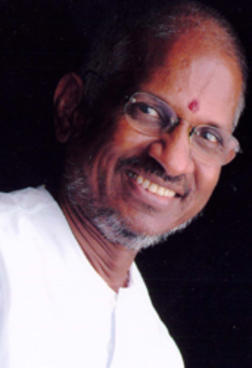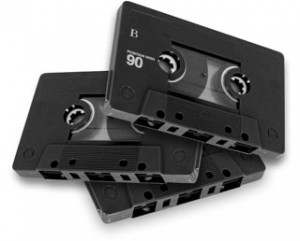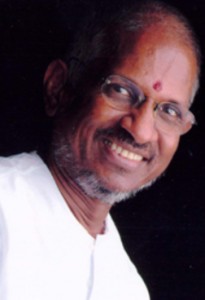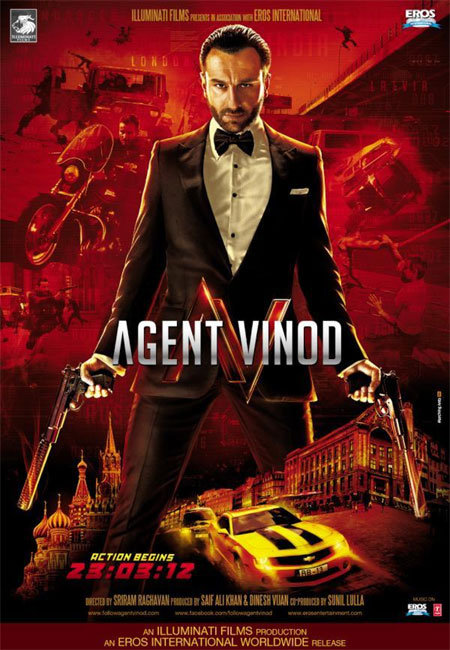by Anupama Krishnakumar
[box]For Anupama Krishnakumar, cassettes always remind her of Ilayaraja, the extremely popular music composer from Tamilnadu. And the maestro’s music, even today, takes her down memory lane – back to the 80s and 90s. “Over the last few months, I have realised that Ilayaraja’s music has accompanied me like a quiet companion, as I was growing up,” she writes. Here’s a tribute from an ardent fan.[/box]Audio cassettes are now clearly a thing of the past – they have been brushed away to dusty corners of homes (or perhaps are even out of homes) and of course to the dusty corners of our minds – those plastic, rectangular devices with two little wheels dutifully supporting lengthy strips of brownish-black tape carrying the inscribed music from the source to its destination. Cassettes remind me predominantly of the late 80s and the early 90s and to some extent, the rest of 90s. My earliest memories of listening to tapes are of those blank Meltrack cassettes that used to come in blue (60 minute tapes) and green (90 minute tapes) colours which Dad used to buy. He would then write down a list of songs that he would like to record, take it to the small shop that used to record songs on tapes and come back with those blank cassettes that brimmed with soulful creation.
Apart from Meltrack, TDK and T-Series are the other blank cassette brands that I distinctly remember. Of course, there were the pre-recorded cassettes that came with covers we died to look at before the release of a movie. In our home though, these cassettes found their ways into our racks only after A.R.Rahman burst into the Tamil music scene. Till then, it was the cassettes we recorded off those tiny shops that ruled the roost – and when I remember these, I can only think of Illayaraja and his timeless compositions. These recorded cassettes were my first tryst with film music as far back as my memory takes me, and this tryst began with listening to the maestro’s music, starting from when I was as young as three years old. There were a few Hindi cassettes too, but Illayaraja was the king who ruled our collection of recorded tapes.
There is one clear memory of a song I loved that I heard on a gramophone record: a Malayalam song, Thumbi Vaa from Olangal sung by S.Janaki, (also performed later as Mood Kaapi in violin) and set to tune by Illayaraja. As a child, I loved that song beyond reason! I distinctly remember the record’s flap had the picture of a laughing woman in the foreground with green stripes in the background. After that, as far as my recollection goes, it has been all about recorded cassettes as far as the music composer is concerned.
Over the last few months, I have realised that Illayaraja’s music has accompanied me like a quiet companion, as I was growing up. I say this with a little bit of surprise because all these years I have been oblivious to this very simple truth. I have never, except till recently, consciously and truly understood how much his music had pervaded my life through all those years of growing up. No, it’s not just about listening for entertainment sake.
Like I have understood of late, after having taken the presence of his songs around me for granted all these years, something about his music makes me go back again and again to those compositions even today. This is probably because his songs filled my younger years with so much music that I carried them within me and tied his musical notes to various instants in time. My mom often says that I was obsessed with the song, Eeramana Rojaave, as a three-year-old, that I used to keep singing it in a loop. And then there are those quintessentially 80s songs like Devan Thandha Veenai, Pothi Vecha Malligai Mottu, Thendral Vandhu Ennai Thodum, Senbagame, Sangeetha Megam, Ilaya Nila, En Iniya Pon Nilaave, Pon Mane, Medhuva Medhuva and Mandram Vandha … ones that I remember humming with whatever lyrics my mind could assimilate as a child – humming them when standing at shops next to Mom, humming them while walking and then later, while cycling down to school, repeatedly singing portions of some songs whose tunes appealed to my mind, as I sat in the terrace, trying to study – sometimes, I remember feeling awkwardly shy too for that gentle madness. Mind you, the entire list isn’t finding its place here because when you begin talking of Illayaraja’s music of the 80s when he literally was ruling the Tamil music industry ripping apart the competition, reducing them to miniscule drops in the ocean of music, you don’t talk songs but talk movies that are fondly looked back at even today for the brilliant music – Johnny, Nizhalgal, Mundram Pirai, Meendum Kokila, Raaja Parvai, Sindhu Bhairavi, Mudhal Mariyadhai, Sathya,Poove Poochuduva, Mouna Raagam, Punnagai Mannan, Nayagan, Karagattakaran and Anjali… a few gems among many such others. And one fondly remembers the 90s for films like Thalapathi, Devar Magan, Chinna Thambi, Mahanadhi, Guna, Captain Prabakaran, Marupadiyum and Kadhalukku Mariyadhai.
I revisit these songs and many more even today – through dozens of playlists created on every music player I can lay my hands on – from the iPod to iPad to my laptop (I so love the shuffle option on all of these) to the USB mp3 player. I should mention here that long after cassettes died their natural death, I still have with me some of those Meltrack tapes, with their cases cracked due to all the travelling they have done with me ever since I left home to study at the age of 17. It is not until 2005, when I moved to Bombay to work, that I sort of stopped listening to these already-slowing-down-due-to-overuse cassettes and switched to the then fast- gaining-popularity CDs.
I remember walking into a music store in Colaba in South Bombay and discovering much to my delight, a CD of Ilayaraja’s ‘How to Name It’ – the album that unleashes his potential to exploit the instrument that he truly is a Master at utilising: the Violin. ‘How to Name It’ is sheer brilliance – every time that I have listened to this album, it has evoked a whole range of emotions in me – from feeling light to experiencing a queer melancholy that has threatened to throw the mental barricades open, ushering in a rain of tears – silent and from deep within.
And when we talk of music that moves even the strongest of minds, how can I forget the evergreen, outstanding and terrific theme track of ‘Mouna Ragam’? A musical piece such as this one is so hard to come by, even after so many years. Or for that matter, the musical ballad composition from Punnagai Mannan.
Melody is no doubt the man’s forte, and any listener of Tamil film music will be able to pull out a sizeable list of his ‘popular’ melody songs. My list has many of these too – but there are these other songs too that are extremely brilliant and perhaps not as popular. If you get a chance, listen to Kannama kadhal ennum kavidhai from Vanna Vanna Pookal for Ilayaraja’s husky voice and some brilliant interlude music, to Sithagathi Pookale from Rajakumaran for some very interesting beats that last the entire song, to Rasave Unnai Nambi from Mudhal Mariyadhai for the soulful rendition by S.Janaki that brims with longing and love, to Poova Eduthu from Amman Kovil Kizhakaale for the sheer village rawness that pervades the song, to Idazhil Kadhai Ezhudum from Unnal Mudiyum Thambi for the honey-dripping melody, to Nil Nil Nil from Paatu Paadava for its surprisingly mood-lifting (this is one song that brings me so much joy) music and rhythm, to Athadi Ammadi from Idhayathai Thirudadhey for Chitra’s exceptional voice and the pure energy of the song, to Ninnai Charan Adaindhen from Bharathi for Ilayaraja’s stirring voice and the devotion in it, to Poo Malarndhida from Tik Tik Tik for the way the song seamlessly moves from Carnatic to Western rhythm and En Veetu Jannal from Raman Abdullah for Bavatharini’s crystal clear voice and the song’s tune itself.
It’s true that I have listened to most of his compositions, if not all. And time and again, they have filled me with a warmth that is difficult to put down in words. The music has never failed to tug at my heart strings, has eased the mind, filling the being with a very beautiful lightness. For me, it has always had that true healing power that people say music is said to have. There’s something definitely unburdening about listening to Ilayaraja’s songs.
The coming of A.R.Rahman two decades ago and over the years, a spate of new composers, both good and bad, have probably pushed Ilayaraja to the background. Yet, who can deny that the man is pure genius? He ruled an era like a king and has given us unparalleled gems of musical creation – music inimitable and transporting. No matter how far we have travelled in time, his songs, joyfully soulful – are here to enthral today and for many years to come. All you got to have is that ear for his musical notes. And Ilayaraja, I bet, wouldn’t disappoint. As for me, if I ever think I should undo the knot on my bag of treasured memories, I definitely know where to head to.
Anupama Krishnakumar loves Physics and English and sort of managed to get degrees in both – studying Engineering and then Journalism. Yet, as she discovered a few years ago, it is the written word that delights her soul and so here she is, doing what she loves to do – spinning tales for her small audience and for her little son, bringing together a lovely team of creative people and spearheading Spark. She loves books, music, notebooks and colour pens and truly admires simplicity in anything! Tomatoes send her into a delightful tizzy, be it in soup or rasam or ketchup or atop a pizza!
[box type=”download”] If you have trouble opening the PDF, please right click on the button and select ‘Save Link As/Save Target As’. This will help save the PDF to your computer. If you still have trouble, drop us a mail at editors@sparkthemagazine.com and we will mail you the PDF straight to your inbox! DON’T MISS THE PDF EXPERIENCE![/box] [button link=”http://www.sparkthemagazine.com/wp-content/uploads/2012/04/spark-april-2012.pdf” color=”pink” newwindow=”yes”] Download the April 2012 Issue as a PDF![/button] [button link=”http://issuu.com/sparkeditor/docs/spark-april-2012?mode=embed&layout=http%3A%2F%2Fskin.issuu.com%2Fv%2Fcolor%2Flayout.xml&backgroundColor=000000&showFlipBtn=true” color=”purple” newwindow=”yes”] Click here to flip and read the issue like a magazine[/button]
[facebook]Share[/facebook] [retweet]Tweet[/retweet]











Panneril Nanaindha Pookal is from Uyire Unakkaga and the music is by Laxmikant-Pyarelal
Rahman is pushed back n number of young composers and illayaraja remains the same as all time favourite
Illayaraja can never be pushed back by anybody any time
Thanks for the wonderful write-up. A small mistake: Panneril Nanaindha Pookal is not from Poove Poochuduva (but from Uyire Unakkaga; music by Laxmikant-Pyarelal, hence the North Indian flavor).
A good attempt to travel back in time with Ilayaraja compositions.